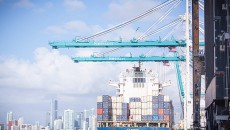
The rapidly spreading coronavirus outbreak has exposed the vulnerability of global supply chains, increasing the risk of a severe economic impact on international commerce as well as inventory challenges and production delays.
The red flag now should be for organizations that have operations or production centers in some of the sections of China with the biggest impact from the virus, and those that need parts for products assembled in China. However, since the start of the crisis in China in January, outbreaks have expanded to other countries, raising concern that the virus, and its consequences, will not pass quickly.
“Coronavirus’ impact isn’t obvious right now, because companies still have inventory,” said Ron Mesia, FIU College of Business supply chain management professor. “If the virus persists, we will see supply chain disruption in three to six months.”
He explained that the first tier of vendors still has inventory as do the second and third tier of suppliers in the chain, but with time, their inventory will be depleted also.
“When that happens, if manufacturers cut back their orders from raw materials suppliers by 10 percent, then wholesalers will reduce them by 20 percent and retailers will reduce their product levels by 40 percent,” Mesia said. “That’s when consumers will see less and less products available on the shelves.”
Technology firms and short life-cycle products that maintain limited amount of inventory, such as Apple and other makers of mobile devices, may face disruptions in their supply chain sooner. Mesia estimates the hardest hit industries will be electronics and car manufacturers because they rely greatly on imports from Southeast Asia.
“The time now is for companies to have a ‘what if analysis,’ examining what will happen at the different stages of the virus process,” Mesia said. “The coronavirus could cause supply chain disruptions that are unlike any we’ve seen in the past 70 years.”
The supply chain is the link of many companies that have nothing to do with each other except interconnections throughout the flow of merchandise. And that depends on inventory.
Because of the role that China’s factories play in global business, they are vital links in global supply chains, taking in shipments of raw materials and sending out a wide range of products.
“The coronavirus illustrates the vulnerability of having so many sources located in one region,” said Mesia, adding that many executives will try to find new vendors that are not in the pipeline creating uncertainty in the decision making. “That’s going to take time to normalize the process in the chain.”




